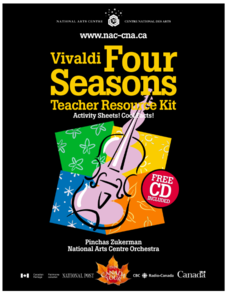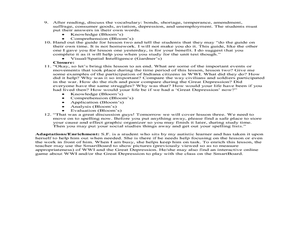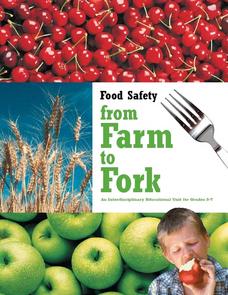State Bar of Texas
Grutter v. Bollinger
A university decides not to allow a qualified scholar to enter its institution based on skin and gender—but this case is about a white female? The 2003 Supreme Court case Grutter v. Bollinger lays the foundation for open discussion and...
Curated OER
A Colony is Born : Lesson 5 - Dear Mem
Discover colonies! Young historians will listen to a primary source journal entry read aloud with a backdrop of wave sounds. They discuss the entry, add historical facts to a chart and personal insights to another. Then they listen to...
Curated OER
Playing Vocabulary Basketball
Learners view a slide show featuring famous athletes and educational institutions that have played a part in the history of basketball. They participate in a game in which a basketball is tossed from person to person as facts and...
Canada's National Arts Center
Vivaldi and The Four Seasons: Teacher Resource Kit
Did you know that Vivaldi wrote "Winter," the final concerto of his The Four Seasons, in the key of F minor to echo the sleigh ride pieces popular at the time? A teacher resource kit, designed to support a study of the work, is packed...
Annenberg Foundation
Controversial Issues in Practice
Wow! This resource provides three related lessons on the First Amendment that challenge US government students to explore their personal opinion on the separation of church and state. Each lesson can be adjusted in length, but is...
Curated OER
Why A Bill of Rights?
Examine conflicting viewpoints in this lesson, in which middle schoolers write their own proposal for including a Bill of Rights in the Constitution. As a class, they discover how the Bill of Rights was not a planned document to be...
The New York Times
The Careful Reader: Teaching Critical Reading Skills with the New York Times
The 11 lessons in this educators' guide focus on using newspapers to develop critical reading skills in the content areas.
Houghton Mifflin Harcourt
Animal Habitats: Extra Support Lessons (Theme 4)
The activities and exercises in this packet, the third in the series of support materials for the Houghton Mifflin Harcourt thematic units on animal habitats, are designed for learners who need extra support with the basic concepts of...
Constitutional Rights Foundation
Driver’s Licenses And Unauthorized Immigrants
Should driver's licenses be granted to unauthorized immigrants? That is the question class members grapple with in a lesson that asks them to first read a fact sheet that details the arguments for and against licensing unauthorized...
Global Oneness Project
The Consciousness of Nature
Scholars voice their opinions about animal consciousness with an article that challenges common ideas about nature. After reading the article, learners engage in a thoughtful discussion before writing out their arguments in a persuasive...
Mr. Nussbaum
THE Founding Father
Who is the founding father—George Washington, Thomas Jefferson, or Benjamin Franklin? Scholars decide which of three early Americans, should be crowned the founding father of America based on research. Then, they compose a persuasive...
Administrative Office of the US Courts
Hazelwood v. Kuhlmeier
Freedom of speech is not always free. Scholars investigate how the First Amendment provides for the right to express opinions. Through the court case Hazelwood v. Kuhlmeier, they analyze free speech using primary documents—and hopefully...
West Virginia Department of Education
Editorials: The Guiding Voice of Authority?
How much can opinion influence a news story? A standalone resource discusses the importance of John Brown's Raid through the lens of journalism. Learners analyze two different texts, one from the perspective of the North and the other of...
Missouri Department of Elementary
How We Are Alike And Different
Scholars develop social awareness by exploring the concept of similarities and differences. Learners examine two beverages and use a Venn diagram to identify similarities and differences. They tally each item to identify if they are more...
News Literacy Project
Fighting Falsehoods on Social Media
It's time to stop misinformation in its tracks. Scholars take an online quiz to see how well they understand social media platforms' policies on spreading false information. After taking the quiz, pupils receive a score with an...
Curated OER
WWI & Depression
Fourth graders describe WWI influence in Indiana. In this guided reading instructional activity students read about the participation of Indiana citizens during World War I. Students give examples of event that changed life in Indiana...
Curated OER
Reading Response Questions
In this reading response worksheet, students answer twenty three questions in short answer format. They answer questions on their reading relating to basic facts, making predictions, explaining why or how, making connections, and giving...
Curated OER
Trap Door Reading: Persuasive Text
Students create T-charts to analyze persuasive text. In this persuasive text lesson students make predictions based upon titles and learn how to make arguments based on facts.
Curated OER
What is News?
Eighth graders discover elements that make a story newsworthy. They play an online game about newsworthy stories and complete a worksheet with partners. They also examine the difference between facts and opinions.
Curated OER
"The Story of Ruby Bridges"
Third graders examine the role of Ruby Bridges in the U.S. Civil Rights Movement. They listen to the teacher read the book "The Story of Ruby Bridges" by Robert Coles, identify what is fact or opinion in the story, and sequence events in...
Curated OER
Food Safety From Food To Fork
Pupils are introduced to the concept of food safety. In groups, they distinguish between fact and opinion and cause and effect while participating in a board game. They write an essay about what knowledge they gained and review the...
Curated OER
Writing My Own Story
In this writing my own story worksheet, 2nd graders follow ten fact and opinion writing prompts to write a simple story about themselves.
Curated OER
Reading The Flag Maker
Students explore The Flag Maker. For this reading comprehension lesson, students listen to the book The Flag Maker, making predictions and answering questions during the reading. Students locate facts and opinions within the book and...
Curated OER
Social Studies Strategies: Opinion Proof
In this strategy worksheet, students read about opinions and their proof, then use a "column note" graphic organizer to write an opinion on the left, and the support, or proof of the opinion on the left.
Other popular searches
- Fact Opinion Lesson Plans
- Fact and Opinion Passages
- Fact Opinion Worksheet
- Fact and Opinion Lessons
- Teaching Fact vs. Opinion
- Fact and Opinion Worksheets
- Teaching Fact and Opinion
- Fact and Opinion Games
- Reading Fact and Opinion
- Fact and Opinion Keywords
- Identifying Fact or Opinion
- Fact Opinion Quiz

























